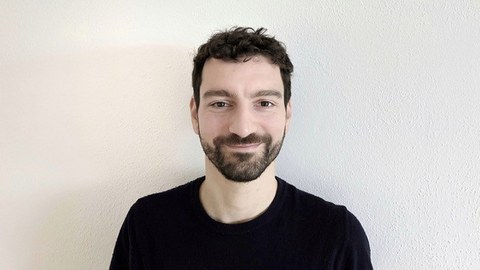Mar 19, 2021
New Emmy Noether group develops innovative methods for the investigation of crystalline materials
On 1 March 2021, the new Emmy Noether research group “Mesoscale Material Modeling and Simulations (3MS)” started working at the Faculty of Mathematics at TU Dresden. Group leader Dr. Marco Salvalaglio, an Italian physicist and material scientist, will benefit from the interdisciplinary research environment at TU Dresden, closely cooperating with the Dresden Center of Computational Materials Science (DCMS). Together, they will develop novel methods to investigate crystalline materials able to bridge length scales, thus paving the way to novel, large-scale investigations. The project is funded by the German Research Foundation (DFG) with up to 1.5 million euro for six years.
Crystalline materials are ubiquitous. They can be found in rocks, in living organisms and are essential for most electronic devices we use nowadays. They exhibit peculiar macroscopic features, such as faceted morphologies or elastic/plastic response to external load, which, however, originate from the microscopic arrangements of atoms in periodic lattices. With his Emmy Noether research group “3MS”, Dr. Marco Salvalaglio aims to research crystalline materials properties by developing a comprehensive collection of techniques based on the so-called phase-field and phase-field crystal models.
The application of these phase-field models will provide a coarse-graining of crystalline structures, such as focusing on large length scales retaining some details of the crystal lattice, particularly those relevant for describing defects and interfaces. This will make it possible to tackle open problems as well as the study of general properties and specific mesoscale aspects of technologically relevant systems, such as polycrystalline materials and crystalline heterostructures.
Dr. Salvalaglio is glad about having found the ideal research environment for this challenging project: “I have been a guest researcher at TU Dresden thanks to an Alexander von Humboldt Fellowship from 2016 to 2018. Afterwards, along with a few research stays abroad, I kept working on projects that originated from this research period. At TU Dresden, and in particular at the Institute of Scientific Computing at the Faculty of Mathematics headed by Prof. Dr. Axel Voigt, I found the complementary knowledge I need to tackle challenging material science problems with the aid of state-of-the-art computational techniques. The project funded by the Emmy Noether Program is highly interdisciplinary. It involves developing new models, their implementation thanks to advanced numerical techniques, and their application.”
Therefore, the “3MS” group will closely cooperate with other researchers within the framework of the Dresden Center of Computational Materials Science (DCMS): “DCMS is a unique environment as it connects several theoretical material science activities involving classical and novel approaches, also in close contact to experimental groups. I have become a full member of DCMS and thus I will benefit from the broad experience and expertise conveyed and exchanged therein,” states Dr. Salvalaglio.
Website of the group: https://www.3msgroup-tud.de/
Media inquiries to:
Dr. Marco Salvalaglio
Institute of Scientific Computing
TU Dresden
Email:

